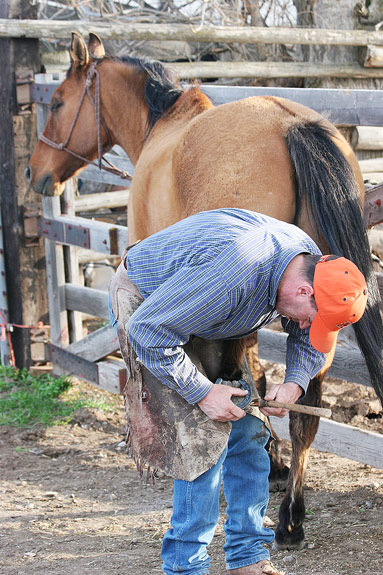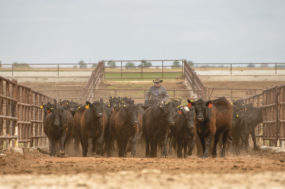Ranch horses must be managed just like other aspects of your cattle operation. We often take them for granted by turning them out in the horse pasture and expecting them to be ready at a moment’s notice.
My personal experience has found that hoof care, nutrition and health are the primary considerations to keep your horses ready to go to work when you are.

Invest in a farrier
I cannot think of many things that are more aggravating than to catch a horse in the pre-dawn hours and find he has lost a shoe.
We can then scramble and tack on another one or we have to catch another horse.
I started out having the ranch hands shoe their own horses and we consistently were losing shoes or having horses lame due to nails not being placed correctly.
I finally bit the bullet and hired a farrier to shoe all the horses, even though I thought the cost was less than reasonable. It was surprising that, after the first shoeing, we were not losing shoes and our lameness issues decreased to almost zero. It was one of the best management decisions I made.
There are many lameness issues that arise from improper trimming and shoeing which can be avoided with a competent farrier.
The hoof angles determine the alignment of joints and that can be good or bad depending on the quality of the work.
There are a lot of great farriers across the country and many will negotiate a better price if they are able to do several horses at one site.
If you happen to operate in an area where horses don’t need to be shod, then they still have to be trimmed and the hoof angles and quality of the trim job will determine the soundness of your horses. A good farrier is a good investment.
Nutrition staples
Nutrient requirements will depend on how hard the horses are working and diets can be adjusted accordingly.
Many ranchers overlook the need to supplement horses during times of hard work. The supplement can be as minor as better-quality hay or they may need a grain supplement to meet energy requirements.
The nutritional needs are directly influenced by the amount of work we are expecting of the horses. If horses are not working, then the pasture will likely meet their nutritional requirements.
Remember that when allocating pasture resources, horses are considered to be 1.25 AUM. That is 25 percent more than is required by a 1,000-pound cow.
Most ranches have a horse pasture or trap that is close to the barn that gets year-round grazing from the ranch horses.
It is recommended to monitor the forage availability of that pasture to make sure it is meeting the requirements of the horses. We should also consider rotating pastures and giving the “horse pasture” a rest the same as when we rotate cows through other pastures.
Deworming for health
Animal health is always important in all of our ranch animals, but possibly more important in horses because they are needed to get work done with the cattle.
Many parts of the nation where ranch horses are used are breeding grounds for parasites. Parasites are costly in that they rob the animal of needed nutrients and cost the producer money. It doesn’t help us to supplement if the parasites are taking the nutrients.
A consistent deworming program with your local veterinarian is important. Your veterinarian can also help with vaccinations.
The specific vaccinations vary by area so, again, your local veterinarian is a great resource. The emergence of West Nile Virus has become a significant issue for horse owners.
If you are in an area where West Nile is present, you would be wise to vaccinate. Many horses do not recover from the effects of the virus.
Other areas may have other diseases that warrant vaccination; your local veterinarian is, again, a vital resource. Horses are also prone to dental issues as their teeth are constantly erupting and may require regular care.
“Floating” a horse’s teeth is the process of removing the sharp edges that develop as a result of chewing.
These edges can cause irritation and/or pain that interfere with eating and may cause bad behaviors to develop to the bit. Your local veterinarian can easily diagnose if the horse needs dental attention.
Bottom line, take care of your horses and they will take care of you. Keep their feet sound, keep them well fed and in good health and your horses will get you to the back side of the pasture and get the cattle in the pens. ![]()
PHOTO
An efficient farrier is a sound investment to prevent horse lameness issues. Photos by Progressive Cattleman staff.








